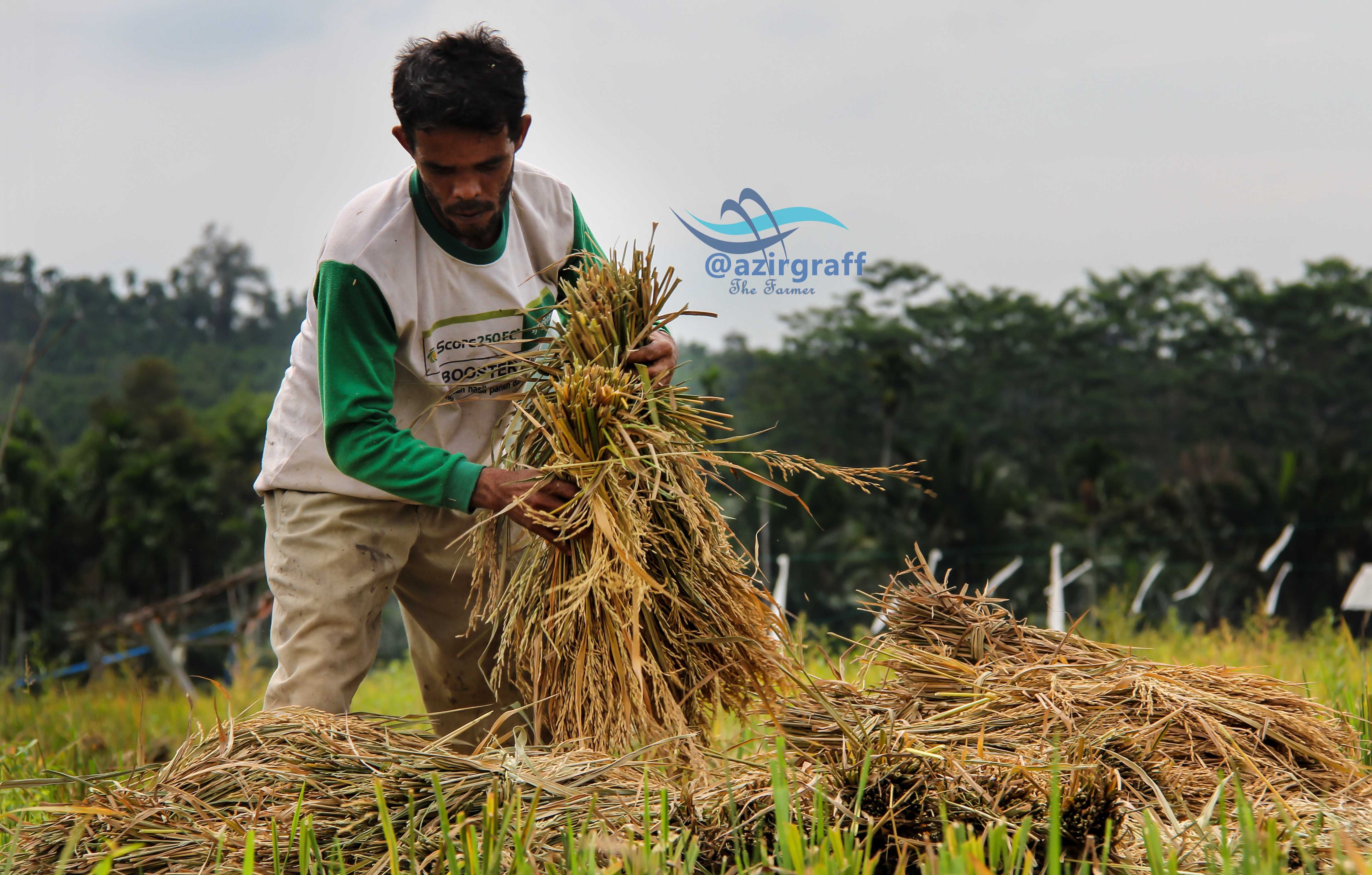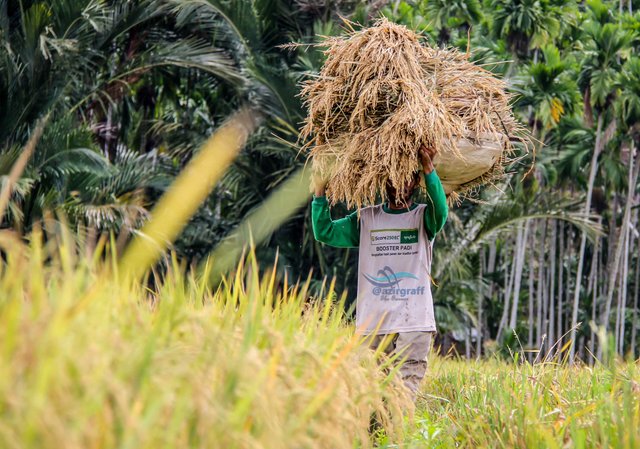Did You Know When Paddy Is Harvested? #Part3
Rice Ready to Harvest and How to Harvest Paddy.

The purpose of harvesting rice is to obtain grain from the field at optimum maturity to prevent damage and loss of yield. Harvesting rice will not be profitable if the process is done at the age of harvest is not right. Incorrect harvests will reduce or loss of results quantitatively, while the right harvest will determine the quality of grain and rice.
Rice harvest is done when the grain of rice is quite ripe. The harvest is not right can reduce the quality of grain and rice.
Before harvesting rice, then it should know about the characteristics of ready-to-harvest rice, what equipment should be prepared and how to harvest rice, here I describe ;
1. Characteristic of Rice Ready to Harvest.
- The flag leaves have dried up and 95% of the grain has turned yellow,
- Optimum age 30 to 35 days from the day after flowering. Depending on the varieties that are cultivated,
- Grain water content ranges from 21 to 26%,
- Grain that fall about 16 - 30% (How to measure it squeezing the panicle by hand).
2. Rice Harvest Equipment
There are several tools needed to harvest rice, among others, as follows ;
- sickle
- sickle jagged
- Rice harvesting machine like Reaper
- Gunny sack
- Rope atc
3. How to Harvest Paddy
Harvesting rice can be done in various ways, depending on the tool used, rice varieties and how to threshing the grain to be done. Here are some ways to harvest rice ;
- How to harvest new superior rice varieties with sickle can be done by cutting the top, cut the middle or bottom depending on how threshing.
- harvest rice with cut bottom, generally done when threshing by way of slamming
- Harvest the rice by cutting the top or cut the middle when done thresher using thresher machine

Post Harvest Rice
After harvesting, rice immediately collected to a place close to the thresher. at the rice collection site use a pad or mat to keep the granules not fall to the ground. Rice threshing is the post-harvest stage of rice after cutting or harvesting. The purpose of this stage is to remove grains from grass. At time of threshing rice, there are several things that need to be done that is as follows.
- Rice that has been collected should immediately
- To avoid the amount of grain that is scattered should be used pedestal, used plastic, tarpaulins, woven bamboo or mats
After the rice is harvested, the grain should be threshed panicles immediately. Place threshing can be done in fields or on the home page. This threshing can be done by human labor or machine tool. Rice threshing is one of the post-harvest stages that contributes significantly to the overall yield loss and quality of rice, it is necessary an effort to find the right alternative of hair loss so that the result of rice threshing produces good quality grain and small yield loss.
1. How to Tear Down Rice Seeds
Threshing rice can be done manually or by machine. How to threshing rice can be done in various ways, namely : stepped on, hit, slam andThresher pedal / thresher / thresher strength.
2. Grain Cleaning
Cleaning is the process of separating rice or grain from foreign matter or other impurities that will damage the seed / grain when it is stored. The aims and objectives of grain / paddy cleaning are as follows : Speed up drying time, Minimize the cost of drying, avoid worsening or grain damage during storage, avoid material from conveying and grinding damage, Avoid ingredients from grade reduction dan minimize the need for space and storage.
3. Grain drying
Drying activity is one of the important activities in the effort to maintain the quality of grain. Newly harvested grain water content ranges from 20 - 25%, so it needs to lower its water content by drying until the grain reaches maximum water content 14%. The purpose of drying is so that the grain is not easily damaged when stored, fine rendement and good quality. To achieve this objective, the drying should be done immediately after harvesting and threshing to prevent the yellow grains. Grain drying is generally done by utilizing the heat of the sun, but if the harvest occurs during the rainy season it is advisable to use an artificial dryer such as a drayer or a dryer silo.
4. Dry grain Storage
The purpose of storage is to prolong the period of supply of food. Things to consider in storage are as follows
Grain stored with maximum moisture content 14% clean from dirt, empty grain maximum 3%
Using a clean and pest-free container bag
Warehouses or storage granaries are cultivated to be constructed extending from the east-west direction. To avoid the extent of the walls exposed to the sun for too long, so the warehouse is quite cool
Warehouses or barns must be cleaned from warehouse pests and sprayed with recommended insecticides, including from rat attacks
Air circulation is good enough to keep the humidity and temperature uniform
If the warehouse floor is made of cement, it must use a wooden pad, in order to avoid direct contact between the grain container with the cement floor
Warehouse walls are made in such a way, so as to avoid pests hiding
Prior to drying in the sun, it should be noted that the drying places are free of puddles, protected from poultry and other animals. Other factors to note are as follows:
Drying is done in a place that freely receive sunlight, free from puddles, protected from disturbance of poultry and other animals.
Make a drying floor with a surface of cement and made waves.
If there is a sunny weather the drying of grain should be thickness 5 - 7 cm and backfired once - 2 hours once using tools made of wood or bamboo. When using a drying pad, do not use plastic sheeting because it can affect the increase in water content
The drying time is recommended from 08.00 am to 16.00 hours
If drying of large amounts of grain then at night remain left on the clothesline by digundukkan and covered with plastic, tarpaulins, to avoid rain and dew. If the grains are dried in small quantities, grain should be cultivated indoors using a mat or plastic mat
After the drying is finished (at 16.00) the grain can be put into the sack and stored in the room if the volume is not much. But if the large volume of grain can be left outside, but should be stacked and covered with plastic to avoid dew and rain. By way of drying like this for 2 - 3 days in good weather will be obtained grain with moisture content of approximately 14%. Prolonged drying may result in many broken grains during grinding. There are several things to consider in drying, among others, as follows.
Drying is done as soon as possible after threshing.
The drying place should be exposed to sunlight and free from any chickens or other poultry
If weather conditions do not allow for drying, grain can be heated in indoor space. To replace heat can be used petromax lamp or other heat source. The thickness of the stretch between 2 - 3 cm and the reversal must also be done.
This is all I can explain about how to plant good rice, I apologize for shortcomings and errors writing
Conclusion
Unsatisfactory harvest can reduce the quality of grain and rice. The signs of rice ready for harvest are: a. 95% of the grain is yellow and the flag leaves have dried b. Optimum age 30 to 35 days from the day after flowering
Harvesting rice will not be profitable if the process is done at the age of the harvest is not right. Incorrect harvests will reduce or loss of results quantitatively, while the right harvest will determine the quality of grain and rice.
Harvesting rice can be done in various ways, depending on the tool used, rice varieties and how to threshing the grain to be done.
You can see my previous post.
https://steemit.com/science/@azirgraff/how-to-increase-rice-crop-more-productive-part-1
https://steemit.com/science/@azirgraff/how-to-increase-rice-crop-more-productive-part-2
Farmer life !!!
Source
wikipedia
wikipedia
kusnantokarasan
dosenpendidikan
Best Regards @azirgraff

good writing @azirgraff. if using superior rice varieties and good care, the results would be satisfactory. many farmers complain about the results they get, they do not know what to do. then the posting you share on this platform I believe is very useful. Than
Thanks @mmcsteem, you have read my post and hopefully it can be useful.
nice your post @ azirgraff
keep on working
Thanks @fulsketch
will look very beautiful again if equipped with a peurontok image. Hehehe. good post @azirgraff
Thanks @albuluhi
I like your post. @azirgraff I have followed you
Thanks
Very informative post @azirgraff. An interesting project I've heard of for drying on a small scale is the solar bubble dryer. It aims to make improvements over sun drying, while still remaining affordable.
http://www.knowledgebank.irri.org/step-by-step-production/postharvest/drying/mechanical-drying-systems/the-solar-bubble-dryer
Thank you, what do you mean to give that link to me?
I just thought it was an interesting idea which related to your post. So, I thought you might find it interesting too.
Congratulations! This post has been upvoted from the communal account, @minnowsupport, by azirgraff from the Minnow Support Project. It's a witness project run by aggroed, ausbitbank, teamsteem, theprophet0, someguy123, neoxian, followbtcnews/crimsonclad, and netuoso. The goal is to help Steemit grow by supporting Minnows and creating a social network. Please find us in the Peace, Abundance, and Liberty Network (PALnet) Discord Channel. It's a completely public and open space to all members of the Steemit community who voluntarily choose to be there.
This post has received a 0.35 % upvote from @drotto thanks to: @banjo.